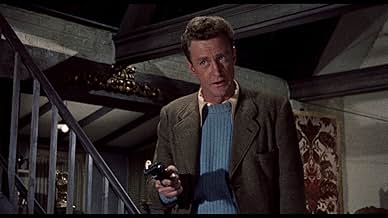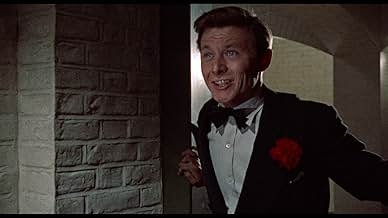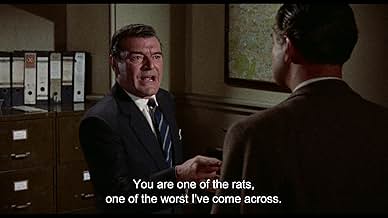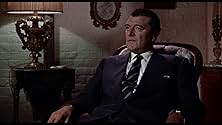CALIFICACIÓN DE IMDb
6.6/10
1.8 k
TU CALIFICACIÓN
Un día normal para el inspector de Scotland Yard, George Gideon, consiste en trabajar en varios casos al mismo tiempo.Un día normal para el inspector de Scotland Yard, George Gideon, consiste en trabajar en varios casos al mismo tiempo.Un día normal para el inspector de Scotland Yard, George Gideon, consiste en trabajar en varios casos al mismo tiempo.
- Dirección
- Guionistas
- Elenco
Henry B. Longhurst
- Rev Mr. Courtney
- (as Henry Longhurst)
- Dirección
- Guionistas
- Todo el elenco y el equipo
- Producción, taquilla y más en IMDbPro
Opiniones destacadas
The novel 'Gideon's Day' was the first in the Gideon series by John Creasey (written under the pseudonym of J J Marric) and was published in 1955. Each book in the series followed 'G G' (George Gideon) through a period of time. Cases that came up during that time were not necessarily solved by the end of the novel: they were kind of a "slice of life" of (Creasey's image of) 50s Scotland Yard.
There are 21 novels in the Gideon series, as written by John Creasey, with the last one published in 1976 (2 years after his death). I did, however, once came across another Gideon novel, written after Creasey's death by another author using the name J J Marric. If you like the Gideon TV series and movie and are interested in the books, make SURE they are by Creasey as anything else is a very poor substitute.
There are 21 novels in the Gideon series, as written by John Creasey, with the last one published in 1976 (2 years after his death). I did, however, once came across another Gideon novel, written after Creasey's death by another author using the name J J Marric. If you like the Gideon TV series and movie and are interested in the books, make SURE they are by Creasey as anything else is a very poor substitute.
Gideon of Scotland Yard is a fine 1950s British detective film based on a book by the prolific writer John Creasey. It stars the inimitable Jack Hawkins as the gruff yet likable detective working hard on a number of overlapping cases during a single 24 hours in London. The film was directed by John Ford, of all people, the man best known for his epic American westerns, who brings a kind of slick stylish look to the screen.
The running time flies past because this is a very entertaining movie, one of the fastest-paced films of the 1950s I've seen. There's never a slow moment, just a building of tension, suspense, and yes, humour, which delightfully offsets the darker and more tragic elements of the plot. Watching Hawkins trying to juggle various cases, crimes, criminals, superiors, underlings, and of course his home life, is a sheer delight. An exemplary supporting cast adds to the experience, making this an all-round winner of a film.
The running time flies past because this is a very entertaining movie, one of the fastest-paced films of the 1950s I've seen. There's never a slow moment, just a building of tension, suspense, and yes, humour, which delightfully offsets the darker and more tragic elements of the plot. Watching Hawkins trying to juggle various cases, crimes, criminals, superiors, underlings, and of course his home life, is a sheer delight. An exemplary supporting cast adds to the experience, making this an all-round winner of a film.
A British crime drama; A story about a complicated day in the life of a Scotland Yard detective.
This comedic, tongue-in-cheek, police detective procedural, is adapted from John Creasey's novel. It is brisk and humorous.
Jack Hawkins plays his part proficiently as the reluctant hero, conveying well the life of a man with a seemingly endless flow of work and family life vexations. The many criminal acts give the film a disjointed feel, and it is dullened by melodrama in parts, but Hawkins holds our attention with his dry humour and charm, suggesting the annoyance and boredom of his job.
The film is shot in glorious Technicolor and exhibits an extraordinary array of British character acting talent. John Ford succeeds in balancing the chaos and confusion of Scotland Yard and its cohorts with the wit and competence of a family man police inspector whose duty is never done.
This rarely seen (or shown) rarity from the great westerns director John Ford, was screened recently as Channel 4's weekday lunchtime movie. The film's alternative title, 'Gideon of Scotland Yard' gives us a clearer picture of where it is set and what it is about.
Not paying much attention to what it said in Radio Times beforehand, I assumed it was a Dixon Of Dock Green sort of black & white semi- documentary, along the lines of the excellent 'Blue Lamp'.
For a start, it's in colour and opens with breakfast time with the family, for Inspector Jack Gideon, all brisk and jovial. His drive to work results in going through a red light and is embarrassingly challenged by a youth PC.
From here-on in, the comedic elements dissipate as Insp Gideon's day unfolds, with phone calls and leads, all going on to illustrate 'the day in the life' that is the title. The mixture of crime is, obviously quite innocent when compared to today and the likes of 'The Bill', but this is 1958 and the censors were always prevalent, not that I'm suggesting that Ford would have set out to paint an overly colourful scenario.
The script is by Ealing Studio regular T.E.B Clarke, from John Creasey's novel and whilst it's not exactly electric, it's brisk enough, with a light tone and those of a certain age will find much pleasure in the period detail, scenes around London and the general way of doing things 'back then'.
Such viewers might have wanted to give a higher score than I am, though. To be honest, the direction could have been done by anyone proficient and whilst the studio-bound indoor sets are well done, they are just that, though also to be fair, Insp Gideon is seen going about between locations enough to remind us that he's very busy...
Finally, there is a nice John Ford sense of irony at the end though, which gives a real sense of satisfaction.
Not paying much attention to what it said in Radio Times beforehand, I assumed it was a Dixon Of Dock Green sort of black & white semi- documentary, along the lines of the excellent 'Blue Lamp'.
For a start, it's in colour and opens with breakfast time with the family, for Inspector Jack Gideon, all brisk and jovial. His drive to work results in going through a red light and is embarrassingly challenged by a youth PC.
From here-on in, the comedic elements dissipate as Insp Gideon's day unfolds, with phone calls and leads, all going on to illustrate 'the day in the life' that is the title. The mixture of crime is, obviously quite innocent when compared to today and the likes of 'The Bill', but this is 1958 and the censors were always prevalent, not that I'm suggesting that Ford would have set out to paint an overly colourful scenario.
The script is by Ealing Studio regular T.E.B Clarke, from John Creasey's novel and whilst it's not exactly electric, it's brisk enough, with a light tone and those of a certain age will find much pleasure in the period detail, scenes around London and the general way of doing things 'back then'.
Such viewers might have wanted to give a higher score than I am, though. To be honest, the direction could have been done by anyone proficient and whilst the studio-bound indoor sets are well done, they are just that, though also to be fair, Insp Gideon is seen going about between locations enough to remind us that he's very busy...
Finally, there is a nice John Ford sense of irony at the end though, which gives a real sense of satisfaction.
This film is unique historically for more than one reason. It is the first - I believe only - cops and robbers film directed by John Ford. It is also unique because it is an Irish production. The 'Rising of the Moon' was an Irish production directed by John Ford. He made it clear that he would like to do another. The Irish Lord who had produced the 'Rising' read a book called Gideon's Day by an unknown writer called J.J.Merric. He loved the book, rang John Ford, and sent him a copy. When he negotiated buying the book it was discovered that J.J.Merric was in fact the famous John Creasey. Ford was captivated by the book, the deal was struck, and the wheels set in motion. In the film itself there is no indication that it is Irish other than Cyril Cusack being in it. It is the only Irish film made so far that does not have an Irish factor in its content. The world premier was in the Savoy Cinema in Dublin.
¿Sabías que…?
- TriviaFilmed in Eastman Color, but re-titled and released in USA in black-and-white.
- ErroresThe background scene of London outside Gideon's office windows is actually a miniature set rather than back projected film. This is revealed by the fact that the cars and buses crossing the bridge are clearly small models or toys. In fact in the opening shot of Gideon looking out of his office at night, the miniature is used on its own instead of inserting stock footage, and the model vehicles are particularly noticeable.
- Citas
[Gideon goes to arrest a woman and is confronted by her lover who brandishes his gun at Gideon]
Insp. George Gideon: There's a police car outside with two men in it. And if you were fool enough to fire that gun...
Paul Delafield: I don't see why you should speak in the subjunctive. I *am* going to fire this gun.
- Créditos curiososWhen title music plays "London Bridge is Falling Down" there is a full-screen picture of Tower Bridge.
- ConexionesReferenced in Ken Adam: Designing Bond (2000)
Selecciones populares
Inicia sesión para calificar y agrega a la lista de videos para obtener recomendaciones personalizadas
- How long is Gideon of Scotland Yard?Con tecnología de Alexa
Detalles
- Fecha de lanzamiento
- Países de origen
- Idioma
- También se conoce como
- Gideon of Scotland Yard
- Locaciones de filmación
- MGM British Studios, Elstree Way, Borehamwood, Hertfordshire, Inglaterra, Reino Unido(studio: made at M. G. M. British Studios, Boreham Wood, Herts)
- Productora
- Ver más créditos de la compañía en IMDbPro
- Tiempo de ejecución1 hora 31 minutos
- Color
Contribuir a esta página
Sugiere una edición o agrega el contenido que falta

Principales brechas de datos
By what name was Un crimen por hora (1958) officially released in India in English?
Responda































